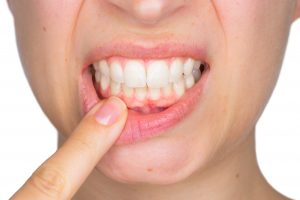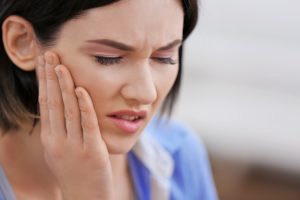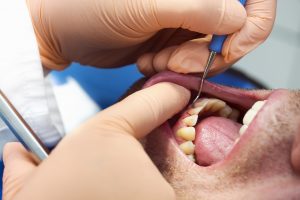Author: craigentinny
What’s the Difference Between A Tooth Infection And An Abscess?
 When the nerve inside a tooth becomes damaged, bacteria can build up around it. If left untreated, the continuing buildup of bacteria can cause an infection which can spread to the top of the tooth and gums. This can cause an abscess.
When the nerve inside a tooth becomes damaged, bacteria can build up around it. If left untreated, the continuing buildup of bacteria can cause an infection which can spread to the top of the tooth and gums. This can cause an abscess.
– If caught in time, your dentist may be able to use root canal treatment to clean out the tooth.
– Keeping your teeth clean will reduce excess bacteria.
– Have regular check-ups with your dentist to ensure that your teeth and gums are healthy.
See your dentist if you’re experiencing tooth pain.
Read the full story here: http://yourdentalhealthresource.com/tooth-abscesses-vs-tooth-infections-whats-the-difference/
Chewing Gum Test Trials
 Occasionally patients experience an inflammatory response to dental implants which can lead to tissue and bone damage. Scientists are developing a form of chewing gum which allows patients to detect early signs of inflammation.
Occasionally patients experience an inflammatory response to dental implants which can lead to tissue and bone damage. Scientists are developing a form of chewing gum which allows patients to detect early signs of inflammation.
Key takeaways
– Keep teeth and dental implants clean by brushing twice daily
– See your dentist for regular check-ups
– Follow a healthy diet and quit smoking to promote good oral health
Self-testing with gum is still a few years away but could lead to early detection of dental problems.
“Chewing gum rapid tests for other medical applications are presently under development.”
Full article:
Oral Cancer Screening: The Facts
 Adults over the age of eighteen should receive annual oral cancer screening, as part of their routine dental appointments. As well as examining your teeth, the dentist will also look for any issues with the tongue, lips, gums or throat.
Adults over the age of eighteen should receive annual oral cancer screening, as part of their routine dental appointments. As well as examining your teeth, the dentist will also look for any issues with the tongue, lips, gums or throat.
– Symptoms can include: soreness, numbness, an ongoing sore throat, white/red spots or patches and sores which fil to heal.
– Smokers or tobacco uses may need earlier or more frequent screening.
– Speak to your dentist if you have any concerns about oral health.
Catching oral cancer early can improve your chances of successful treatment!
Read the full story here:
http://yourdentalhealthresource.com/from-what-age-should-i-get-screened-for-oral-cancer/
Teeth-grinding in teenagers is a sign of bullying
Recent research suggests that teeth-grinding interns could be as a result of being bullied. Students who are being bullied are more likely to suffer from teeth-grinding than those who are not:
Key takeaways:
– Teeth grinding can cause enamel erosion, sensitivity, chipping and cracking, pain radiating to the ear and teeth loss!
– If your child is grinding their teeth, they could be undergoing mental stress.
– Manage bruxism by turning to healthy stress coping methods, healthy lifestyles and having enough sleep.
See your dentist to treat your already damaged teeth.
For more information, visit:
Dry mouth and tooth decay
A dry mouth can eventually lead to tooth decay, so it is important to avoid this as much as possible.
Key takeaways:
– A dry mouth can be caused by frequent mouth breathing, not drinking enough water and some medications
– Inadequate levels of saliva in a dry mouth mean teeth aren’t protected from harmful acids produced by oral bacteria, potentially leading to tooth decay
– See your dentist if you have any concerns about dry mouth
“Getting the cause of dry mouth addressed is essential to having a healthy smile for the future!”
Read the full story here: http://yourdentalhealthresource.com/can-dry-mouth-lead-to-tooth-decay/
The Link Between Genetics And Oral Health
Physical appearance and personality traits are influenced by our genes. Scientists also indicate that some people could be at higher risk of developing gum disease, tooth decay and other dental issues as a result of their genetic makeup. However, the over-riding message is that the way that we take care of our teeth and overall health still has the greatest impact of all.
– Maintain a daily routine of brushing and flossing.
– Exercise, eat healthily and avoid smoking and too much alcohol.
– Visit your dentist regularly.
Our smiles are the result of our genetic makeup. Read the full story here:
http://yourdentalhealthresource.com/are-genetics-to-blame-for-poor-dental-health/
What is dry socket and how can it be avoided?
After a wisdom tooth is removed, a blood clot will temporarily form to protect the gum and nerves. If these are exposed, a condition known as ‘dry socket’ can develop, causing sensitivity, pain and infection.
– Help to keep the area clean whilst it heals. Brush and floss your teeth regularly, taking care around this area.
– Smoking, stress, carbonated drinks and straws can slow the healing process.
– If you experience sensitivity, pain, discharge or a strange taste in the mouth, speak to your dentist straight away.
Allowing the wound to heal undisturbed can help prevent dry socket.
Read the full story here: https://consumer.healthday.com/dental-and-oral-information-9/misc-dental-problem-news-174/after-wisdom-tooth-removal-watch-out-for-dry-socket-721946.html
Antibacterial toothpaste: good or bad?
Antibacterial mouthwashes are not generally recommended, as they can harm good bacteria on the tongue, which us to utilise essential nitrates from food we eat. Antibacterial toothpastes have less contact with the tongue, so they are considered safe.
When healthy bacteria on the tongue are killed – the bad bacteria run rampant. This can trigger inflammation throughout the body, increasing risk of serious medical problems like heart disease.
– Brush your teeth and floss daily, using a non-antibacterial toothpaste.
– If you are currently using mouthwash containing triclosan, check with your dentist as to its suitability.
– Maintain a healthy diet with plenty of green leafy veggies and beets, which contain nitric oxides.
Nitrates come from vegetables in our diets, such as beets and green leafy vegetables. Read the full story here: http://www.care2.com/greenliving/antibacterial-toothpaste-harmful-helpful-or-harmless.html
Say cheese for a healthier smile!
Did you know that you can eat your way to a healthier smile?
Key takeaways:
– Dairy products such as cheese and yogurt have multiple dental benefits such as providing calcium for strong teeth and protecting the enamel from erosion.
– Crunchy foods such as celery, carrots and apples stimulate the production of saliva which reduces cavity formation by washing away harmful bacteria.
– Your dentist can advise on other dietary tips to keep your smile healthy.
“Healthy diets can strengthen the teeth from within, far more efficiently than a miracle mouthwash or a special toothpaste.”
Read the full story here: https://www.healthresource4u.com/eating-your-way-to-a-healthier-smile.html
Dentists Cutting Back on Opioids
Opioid addiction has been linked to dental procedures as the drugs are regularly used during the extraction of wisdom teeth. Used in anaesthesia and as a pain killer, opioids are known to be addictive and even small doses over a short period can lead to addiction problems.
According to statistics:
– 25% of patients prescribed a short course of opioids were still on the drug a year later
– 75% of opioid abusers began with drugs prescribed by a dentist or doctor
– 80% of heroin addicts started on opioids
It is also estimated that children prescribed opioids in elementary school “have a one-third chance of lifetime illicit use”.
Further information on the topic can be found at https://www.nytimes.com/2017/07/10/opinion/dentists-opioids-addiction-.html.
